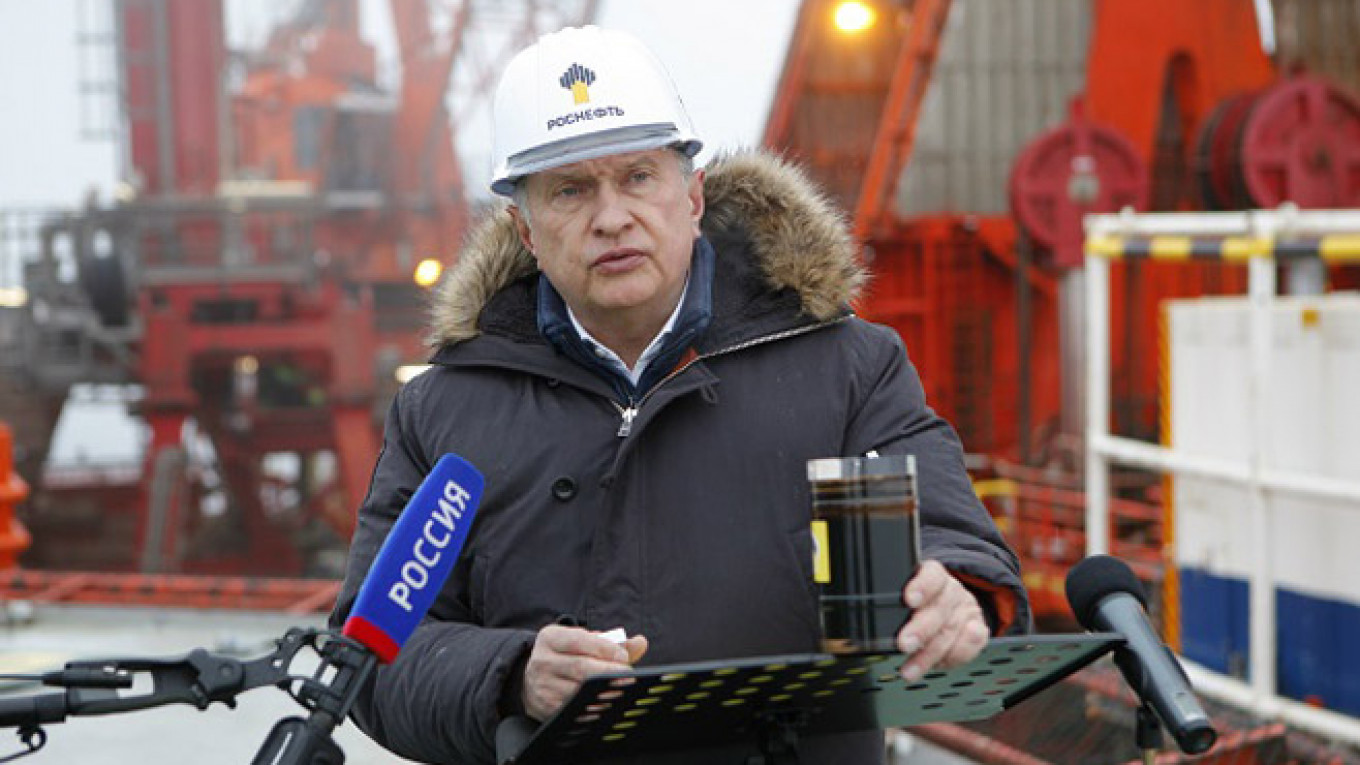ExxonMobil and Russia's Rosneft announced in October that they had struck oil in the Arctic. Rosneft CEO Igor Sechin dubbed the underwater field where the oil was discovered "Pobeda," which means "victory" in Russian.
Due to U.S. sanctions, however, work stopped soon thereafter, leading some to claim that Russia's Arctic energy ambitions would be frozen by the West. But oil companies are playing a long game in the Arctic, and for all players — Westerners, Russians and their governments — Arctic oil is just too valuable to give up.
First, it's important to note that the sanctions against Rosneft were never a game-changer. Despite Washington's ban on Western funding and oil technology transfers to Rosneft, Russia's largest oil company, from all accounts the relationship between ExxonMobil CEO Rex Tillerson and Russian President Vladimir Putin is still quite cordial.
Wriggle room was evident in Exxon's ability to press Washington for a two-week extension in order to safely wrap-up exploration. Rushing the halt of its Arctic activity was never an option for risk-adverse Exxon, ever keen to avoid a Valdez 2.0.
For now, Exxon appears to toe the sanction line. But it is unlikely that the giant will cede its commercial endeavors with Russia entirely. The Russian Arctic matters a great deal to Exxon's bottom line, with the region touted as a leading future revenue base. When it comes time to review the possibility of lifting sanctions, ExxonMobil will certainly have something to say.
Second, the Kremlin isn't short of international oil companies looking for a piece of the Arctic pie. Leading estimates place the majority of the Arctic's hydrocarbon prize in Russian territory. It is important to note that Arctic hydrocarbon production is slated to take place in quite some time; earliest estimates place operations online by 2025, giving sanctions plenty of time to run their course without majorly impacting companies' plans.
Third, pressures stemming from our global energy insecurities will facilitate the inevitable production of Arctic resources. As traditional hydrocarbon reserves deplete globally, China's energy hunger intensifies, and India's energy thirst emerges, it's no longer a case of "if" but "when" the Arctic is tapped.
Finally, these short-term delays are a long-term win for the Arctic environment. The Arctic is set to be a major resource base for international energy as well as a significant transportation route between Asia and Europe. The slower pace and risk adverse exploration in the development of the resource base and shipping routes will ensure our best shot at a safe operational environment.
For now the Kremlin is busy assuring the world that it is willing to proceed with Arctic exploration despite Exxon seemingly sidelined. But the Kremlin certainly isn't able to proceed as long as the West has cut off the technology required and cash needed to fund it. But with Europe's winter nearing and the U.S. increasingly preoccupied by another Middle East incursion, it is likely that these energy sanctions will crumble.
Regardless of the sanctions and their perceived pressure, the Arctic is a long game and, behind the scenes, it will remain very much open for business.
Elizabeth Buchanan is a Ph.D. candidate at the Centre for European Studies at The Australian National University, Canberra.
A Message from The Moscow Times:
Dear readers,
We are facing unprecedented challenges. Russia's Prosecutor General's Office has designated The Moscow Times as an "undesirable" organization, criminalizing our work and putting our staff at risk of prosecution. This follows our earlier unjust labeling as a "foreign agent."
These actions are direct attempts to silence independent journalism in Russia. The authorities claim our work "discredits the decisions of the Russian leadership." We see things differently: we strive to provide accurate, unbiased reporting on Russia.
We, the journalists of The Moscow Times, refuse to be silenced. But to continue our work, we need your help.
Your support, no matter how small, makes a world of difference. If you can, please support us monthly starting from just $2. It's quick to set up, and every contribution makes a significant impact.
By supporting The Moscow Times, you're defending open, independent journalism in the face of repression. Thank you for standing with us.
Remind me later.


